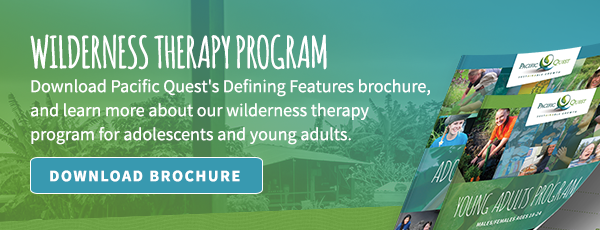June is Post-Traumatic Stress Disorder (PTSD) Awareness Month, and here at Pacific Quest, we offer horticultural therapy as a form a therapy for clients who may be struggling with trauma and/or PTSD. Horticultural therapy has long been used to help people with these conditions. In the 1940s and 1950s, American war veterans — many of whom were then diagnosed with combat exhaustion (now referred to as PTSD) — routinely engaged in supervised gardening as a means of therapy.
Horticultural therapy combines the cultivation of flowers, trees, fruits, and vegetables, with counseling provided by trained therapists. It’s a long-established nature practice, which has emerged as a powerful form of psychotherapy.
In addition to helping older adults, garden therapy also helps teenagers and younger adults deal with trauma and stress, secondary to many conditions like PTSD, depression, anxiety and so forth, according to a recent article published in Complementary Therapies in Medicine.
At Pacific Quest’s horticultural program, our clinicians and program guides present garden therapy for teens in a way that meets specific and individual therapeutic goals — which focus on health and change, all while immersed in nature.
The Physical and Mental Health Benefits of Horticultural Therapy
A growing body of research focuses on the physical and psychological benefits of being outdoors and gardening in a therapeutic atmosphere. Here are some of the many benefits of garden therapy for teens:
- Improvement in immune system functionality
- Increased brain wave function
- Decrease in blood pressure
- Decreased muscle tension
- Decrease in stress hormones
- Decrease in pain
- Decreased anxiety
- Decreased depression
The Emotional Benefits of Horticultural Therapy
Horticultural therapy is especially good at promoting a sense of well-being among teens. First, gardening in a supportive and expressive environment instills feelings of hope, accomplishment and gratification. As many can attest, watching a garden grow and thrive is a transformative experience, which warms the heart. Second, by working with a team toward a common goal, social and communication skills improve. Also, by working with a cohesive group of counselors and peers, participants learn that they are not alone in their problems and draw support to cope with stress and trauma. Finally, horticultural therapy imbues a sense of altruism or a concern for others and the surrounding world.
In addition to the presence of compassionate and constructive counseling, garden therapy for teens works best when you or your teen focus your concentration fully on the task at hand. Thus horticultural therapy should be challenging. When concentration and dedication are intense, the weight of problems and worries fade away — a phenomenon known as “flow experience.”
At Pacific Quest, teens are given ample opportunity to attain a flow experience and learn to organize a nursery, prioritize crop rotation, plan planting schedules, design garden beds, compost and experiment with more efficient, sustainable and creative gardening techniques. These skills will no doubt last a lifetime.
